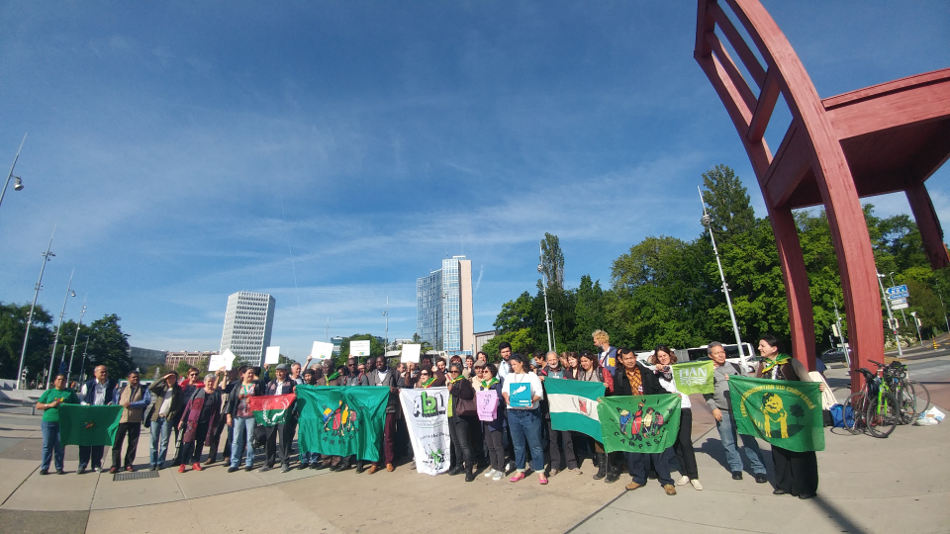The ‘UN Declaration on the Rights of Peasants and Other People Working in Rural Areas’ will be up for adoption at the UN Human Rights Council in Geneva this week. People are watching closely.
About two years ago, in mid-November 2016, over a thousand police personnel, armed with guns, batons and assisted by bulldozers descended on Mekar Jaya – a village in North Sumatera in Indonesia – to forcefully evict hundreds of peasant families who had been living there since 1952. In that week, more than 550 hectares of farmland were violently cleared to be diverted for palm oil cultivation, allegedly at the initiative of a private firm that has been eyeing this land to promote its agribusiness. Two years hence, the peasant communities are awaiting justice. The State, which has a constitutional responsibility to protect peoples’ interests, is accused of providing tacit support to these eviction efforts.
Land grab in Mekar Jaya is among a million violations going on in the world right now. For the business elites, land is a mere commodity to build and expand their enterprises upon, whereas for us – the world’s peasants and rural workers – it represents life. Our territories that include land, forests, rivers and oceans are intrinsically linked to our identities, social and cultural practices, while providing food and shelter.
In a fact sheet released in 2014 by UN-Habitat and UN OHCHR, “forced evictions commonly result in severe trauma and set back even further the lives of those that are often already marginalized or vulnerable in society.”
But that is not all.
Today billions of us, representing one-third of the global population, are facing increasing violation of our rights in the form of forced evictions, unfavorable production methods, unfair trade policies and poor working conditions. When we resist, criminalization and murder often come as consequences.
Smallholder food producers and rural workers are key to achieving food sovereignty. We feed the world. We are essential to realizing peoples’ right to food, and are indispensable in fighting climate change, conserving biodiversity and revitalizing rural economies. That was why in 2001, as La Via Campesina – the global movement of peasants, indigenous people, migrant and rural workers – we started demanding from the United Nations, an international instrument to redress our concerns. By 2008, after several rounds of deliberations in Asia, Africa, Latin and North America and Europe, we were successful in initiating a process within the United Nations Human Rights Council (UNHRC) for a ‘Declaration on the Rights of Peasants and Other People Working in Rural Areas’. After 17 years of long and tiring negotiations, this Declaration is now at the point of being finalized.
In April this year, the fifth Open-ended Intergovernmental Working Group (OEIWG) was held to discuss the draft text. A consensus was achieved to finalize the text and table it during this 39th Session of the UN Human Rights Council for adoption. Thereafter, the declaration will be taken to United Nations General Assembly for final adoption in New York.
So what is this Declaration about, after all?
It defends peoples’ right to land, seeds, water, decent income and biodiversity. It calls for protection of the environment and Mother Earth and rural women’s rights. From a simple peasants’ declaration set in motion by social movements in 2001, the draft has grown to 28 elaborate articles at this point.
Kate Gilmore, Deputy High Commissioner OHCHR echoed our sentiment when she said, “There must now be finalized – and with some sense of urgency – a robust focused Declaration that can enable Member States to better address the gap in protection for more than a billion people — peasants, rural workers, small farmers, fishers and herders, and others of their communities.”
She added, “To be clear, today, peasants and others working in rural areas have insufficient recourse in the face of the discrimination they suffer and the other challenges they confront when seeking an adequate standard of living when subjected to forced displacement and marginalization.”
However, to have votes in favor of the Declaration at the 39th Session of the UN Human Rights Council this Friday (expected on 28th of September) and its final adoption at the UN General Assembly in New York later on, will require strong political will and commitment from the Member States.
For billions of us whose lives are solely dependent on our land, forests, rivers and oceans, this Declaration is an instrument that can set in motion several policies and legislations in our countries, that could secure our food security, biodiversity and eventually enable peoples’ food sovereignty.
The vote this week therefore, is also a moral choice between the welfare of smallholder food producers and the profitability of a few giant corporations.
People must win in the end.
by Zainal Arifin Fuad
Zainal Arifin Fuad is an Indonesian peasant, a senior leader of the Serikat Petani Indonesia (SPI, Indonesian Peasants Union) and also the International Coordination Committee member of La Via Campesina. He can be contacted at zainal@spi.or.id

